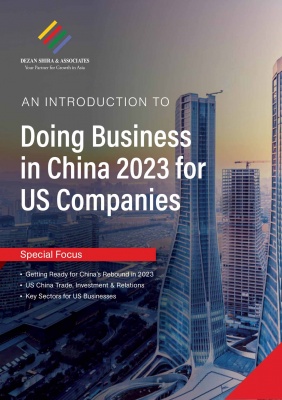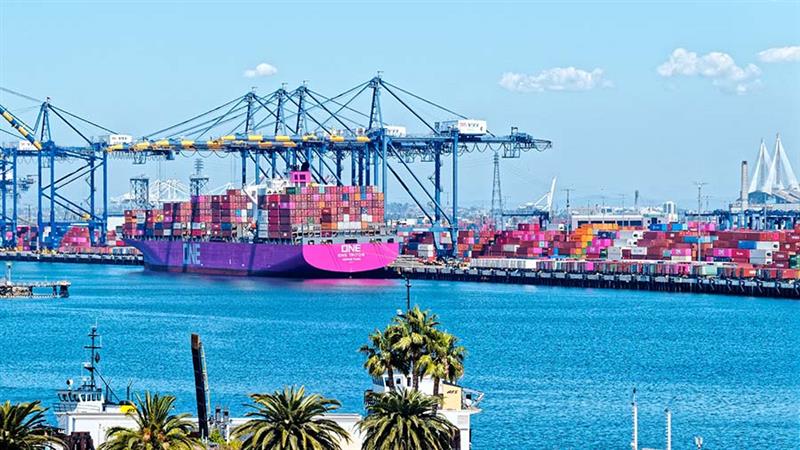US 2023 Foreign Investment into China – Data Analysis on Deals, Values, M&A and Investments
Despite Washington’s negative focus towards Beijing, numerous Chinese industrial sectors are attracting significant US investments. We analyze what’s going on, and where.
By Chris Devonshire-Ellis and Henry Tillman
The previous global clarity of China’s foreign investment has changed during 2023, under a process begun with the United States imposing tariffs on a wide base of Chinese-manufactured products from September 2018. That was linked in part to Washington’s desire to lessen US dependence upon China as a main supplier in certain sectors, and also to provoke the movement of American-owned, China-based export manufacturers to other countries – the beginning of the ‘China Plus One’ concept.
Today that basic creed has been extended to specifically prevent China from making advancements in quite specific technologies, mainly within the IT and AI sectors. Washington has undertaken this at the same time that it has imposed highly restrictive sanctions upon Russia, another technically advanced nation with significant R&D capabilities.
This ‘second wave’ of tariffs and defacto sanctions upon China were instigated in August this year by the Biden administration and were very selective in specifically targeting China’s IT development. The administration released an executive order directing the US Treasury to create a new regulatory program to prohibit or require notification of outbound US investments into China in certain sensitive sectors. It was issued on August 9, this year, and is a targeted order designed to slow down investment into China.
However, this is not the end of the story as concerns American investment into China, despite certain sections of US media portraying it as such. In numerous areas, US investment into China remains buoyant – it is a phenomena where two opposing sides converge – China-negative trade policies, and China-positive consumer dynamics.
2023 Overview

Western media has chronicled the “circling of wagons” to block or at least slow China’s future growth; and has not presented the data below (which expands well beyond standard FDI). This material highlights 2023 regional announced inbound investments, JVs, and licensing agreements involving China based recipients. We cover Q1, Q2 and Q3 in 2023.
Q1 2023 US investment into China

The United States announced nine investments in Q1, but with no disclosed values – no real surprises in these politically nuanced times when also dealing with an over-zealous, often partisan media.
- HP stated that it will step up investment in China, the same quarter in which Dell said it was moving its supply chains out of China.
- Qualcomm Ventures, the VC arm of Qualcomm, announced it would increase its investments Chinese start-ups with a focus on smart driving, AI and the metaverse. In the past 20 years, Qualcomm Ventures has invested in nearly 80 Chinese companies.
- Honeywell announced the opening of a research institute for smart buildings in Shanghai which will focus on building IoT, energy saving, flexible energy use, digital intelligence operation and cross-system integration.
- Ford Motor Co agreed to move forward with $3.5 billion EV battery plant with CATL as a partner. While this was originally scheduled to be a standard equity JV, this project encountered considerable USA national and state pressure with Governor Whitmer supporting this as another step in “replicating Silicon Valley in the state of Michigan.”
- Advent (PE) announced that it has invested in LBS Group, a leading pest control operation and hygiene solutions provider in Greater China operating in more than 30 cities across China and southeast Asia. This was likely a sizeable investment.
- Bain Capital announced it has completed a significant investment in EcoCeres (Hong Kong), a green fintech company. Kerogen Capital led the Series A in February 2022.
- Shanghai LePure Biotech completed its Series C financing with international investors co-led by Novo Holdings, General Atlantic and Goldman Sachs Asset Management.
- Aspire (Chinese e-cigarettes) completed a series C financing round of $100 million, led by Sequoia Capital, SEA and Lightspeed (US).
- Neuberger Berman became the 2nd global asset manager after Black Rock to launch a mutual fund in China since Beijing opened up the 26 trillion RMB (US$391 billion) onshore public fund market to foreign players in 2019.
Q2 2023 US investment into China

- Founded in 2007, Chengdu Jinxin Medical Investment – investors of Jinxin Fuxing Eldercare now include New York’s OrbiMed Advisors and Primavera Capital Group, with a US$80 million investment. Jinxin Fuxing Eldercare provides elderly care services for urban citizens. It offers medical care services, virtual nursing home services, home care, community services, elderly nutrition dining, and more. It caters to elderly patients who are suffering from paralysis, age-related disablement, and more.
- Materials science company Dow has partnered with Procter & Gamble China (P&G China) for recyclable air capsule e-commerce packaging. The air capsule combines Dow’s ELITE AT high-performance PE resins with P&G China’s technology to offer an effective way to protect products. The new packaging reduces excessive packaging without compromising product safety in e-commerce. Compared with traditional corrugated parcel boxes, the air capsule packaging reduces material weight by 40%, thereby requiring only 25% of original trucking and 75% of less warehouse space. The investment was not disclosed.
- Buick will introduce an all-electric coupe SUV in China. The all-new Electra E4, developed on the Ultium platform, will be the brand’s second electric vehicle in its largest market, joining the recently launched Electra E5 SUV. The focal point of the Electra E4’s all-new Buick Virtual Cockpit System is the eye-catching EYEMAX 30-inch integrated curved screen. The driver-centric display has 6K resolution and incorporates a powerful Snapdragon 8155 chip. It allows convenient access to all necessary driving information and vehicle controls, with smooth, intuitive human-machine interaction. The investment value was not disclosed.
- Even as political unrest compels other businesses to revaluate their exposure in China, Exxon Mobil Corp. is moving on with a multibillion-dollar petrochemical complex that serves as the cornerstone of its growth strategy in the PRC. Exxon executives have made several trips this year to check on the status of the project in Huizhou, China. The complex is the largest of a dozen or more new projects being built around the US by businesses that will make Ethylene, a feedstock for plastic. The reward is a sizable interest in the petrochemicals industry’s top growth market, which provides the plastics, resins, and fibres needed by China’s manufacturing sector to produce everyday consumer goods. The investment is estimated at US$10 billion and is to be phased in over time.
- Cargill sells its China poultry unit to US private equity firm DCP Capital. The sale of the unit known as Cargill Protein China is subject to regulatory approvals but is expected to close this year. Cargill did not give a transaction price and DCP declined to comment on the deal. China is the world’s No. 2 poultry producer after the United States, producing about 19 million tonnes of chicken meat last year. China’s DCP Capital has invested in several other food and agriculture businesses including one of China’s top poultry producers Fujian Sunner Development.
- XtalPi Inc., a pioneering pharmaceutical technology company powered by artificial intelligence (AI) and automation, announced an AI drug discovery collaboration of up to US$250 million in upfront and milestone payments with Eli Lilly and Company. The collaboration will leverage XtalPi’s integrated AI capabilities and robotics platform to de novo design and deliver drug candidates for an undisclosed target. XtalPi combines AI “dry lab” and large-scale robotics “wet lab” to form an iterative feedback loop for its onestop drug discovery service and empower more fruitful pharmaceutical R&D XtalPi’s Autonomous Labs have scaled up to a fleet of several hundred workstations and AGVs in Shenzhen and Shanghai, with two new labs currently under construction, one in Shanghai and one in Cambridge, MA.
- Carnival and CSSC Joint Venture are to launch China’s first domestically built large cruise ship. During its inaugural season, the ship will be based in Shanghai, China. It will offer a variety of cruises, including routes to Japan, and Southeast Asia, and round trips. Specific itineraries for the Adora Magic City are yet to be announced. Carnival’s Chinese market brand, Adora, will operate the ship. The construction of the ADORA MAGIC CITY involves a consortium of companies, including China State Shipbuilding Corporation, Shanghai Waigaoqiao, Carnival, and Italian cruise shipbuilder Fincantieri. The ship will be the world’s first cruise ship with 5G mobile broadband connectivity for passengers. Once completed, this ship will mark the first full-size cruise ship ever constructed in China. With a gross tonnage of 135,500, it can accommodate 5,446 passengers. The vessel is designed to cater to a diverse mix of Chinese and international passengers, with a particular focus on retail shopping. It will feature the largest selection of duty-free shops in the region. Furthermore, there is an as-yet-unnamed sister ship currently under construction, expected to commence operations next year.

The Chinese Cruise Ship ‘Adora Magic City’: Chinese built, Italian designed, part American financed.
- A report from the Wall Street Journal pointed out that China’s cross-border fast fashion e-commerce company Shein has completed the latest round of financing of US$2 billion, with a valuation of about US$66 billion, which is about a third less than the US100 billion valuation announced a year ago. The latest round of financing was co-led by Sequoia Capital, General Atlantic and UAE sovereign wealth fund Mubadala. Sequoia Capital and General Atlantic both participated in Shein’s previous rounds of financing. The report also pointed out that investors who participated in the previous rounds received more Shein shares to maintain the size of their holdings. The Wall Street Journal pointed out that Shein’s net profit in 2022 was US$800 million and sales reached US$23 billion, approaching the other two fast fashion giants: H&M Group and Zara parent company Inditex Group. The source also noted that Shein is targeting a 40% increase in sales for 2023, and expects that its GMV will reach US$80.6 billion by 2025, with a profit target set at US$7.5 billion.
- Acorda and Chance sign deals to commercialise INBRIJA in China. INBRIJA features Acorda’s ARCUS pulmonary delivery system, a technology developed to provide medication via inhalation. Acorda Therapeutics has signed distribution and supply deals with Hangzhou Chance Pharmaceuticals for the delivery of INBRIJA in China. INBRIJA is currently indicated in the US for use in the intermittent treatment of episodic motor fluctuations (OFF episodes) in adult Parkinson’s disease (PD) patients who received a levodopa/dopa-decarboxylase inhibitor. It features Acorda’s ARCUS pulmonary delivery system, a technology that has been developed to provide medication via inhalation. Acorda will receive US$2.5 million in an up-front payment, up to US$6 million in a near-term milestone payment, another US$3 million following regulatory approval, along with US$132.5 million in sales milestones. It is calculated that China will have around five million people with Parkinson’s disease by 2030, because of its ageing population.
- DNE Establishes an RMB 14 billion (US$2 billion) JV for Logistics Infrastructure in China (Warburg Pincus). The DNE Group (“DNE”), a leading new economy infrastructure investor, developer and operator in China, announced that it has established an offshore development JV Platform with a leading global institutional investor to pursue investment opportunities in high-quality industrial and logistics assets in key economic clusters in China. The JV Platform focuses on the development and operation of institutional-grade industrial and logistics facilities in key logistics hubs across China, including the Yangtze River Delta, the Greater Bay Area, and the Beijing-Tianjin-Hebei region, serving and supporting the fast-growing new economy enterprises in e-commerce, modern manufacturing, cold chain, and logistics.
- Bioyond Tech, a Chinese provider of intelligent automation software for life sciences, medical and health care companies raised US$29.1 million in Series A funding, including Lilly Asia Ventures, CICC and Sequoia.
- Storefriendly, the Asia self-storage operator backed by Blackstone, introduced its two latest locations at redeveloped properties on Hong Kong Island and in the New Territories. Storefriendly Tower Island East, completed last October, at the site of the former Elegance Printing Centre on Kung Ngam Village Road in Shau Kei Wan was purchased by Blackstone in November 2021 for HK$500 million ($64 million) from the family of late “Shop King” Tang Shing-bor. The amounts were not disclosed.
Q3 2023 US investment into China

- Thermo Fisher entered into a strategic agreement with Belief BioMed Inc. Thermo Fisher innovates on antibody pharmaceuticals. The value was not disclosed.
- Starbucks set a new benchmark in sustainability for China’s specialty coffee industry and completed its vertical integration in China at scale ‘from bean-to-cup’ – a first for the company globally. This was Starbucks largest international investment in a coffee manufacturing and distribution center, at RMB1.5 billion (~US$220 million). Located in Kunshan, an hour from Shanghai, the 80,000m2 CIP features a roasting plant deploys Starbucks most energy efficient technology, a state-of-the-art integrated distribution center (IDC), and an immersive experience center. It imports high quality Arabica green beans for roasting, packaging, storage, and distribution, while showcasing the ‘bean-to-cup’ coffee journey to visitors and providing coffee related training – all in one location.
- Baidu partnered with Qualcomm’s local unit to cooperate on extended reality (XR) technology and jointly create a new platform for the metaverse along with compatible services. In a post on local messaging service Weixin, Baidu stated the pair inked a non-binding strategic agreement which also covers work on generative AI. The Chinese company added it will be able to build XR applications and content more quickly by integrating Qualcomm’s Snapdragon Spaces XR developer platform and related XR technologies into its XiRang metaverse platform. Baidu noted it will combine its cloud and AI technologies and other platforms to explore applications for a wider range of industries, citing tourism, education and sports. Qualcomm global SVP Cheng Lixin suggested the partnership will accelerate the development of China’s metaverse. The amount was not disclosed.
- Thermo Fisher – Faith Pharmaceuticals – a partnership in genetics. The value was not disclosed.
- Ford Expands Chinese JV Activities. Ford is set to increase its footprint in China with the establishment of a new joint venture with Changan Automobile. Changan Ford and Changan Automobile will operate the as yet unnamed venture in what the Chinese automotive market regulator said will be concentrated on the “the supply of new energy passenger vehicles and the distribution of Ford brand models.” The term “new energy passenger vehicles” refers to vehicles with electric, plug-in hybrid or range extender drivetrains. Ford Changan says the aim of its joint venture is to help the company “better grasp the development trend of electrification and intelligence in the automotive industry.” Changan Ford will control a 60% stake in the new joint venture company, and Changan Automobile the remaining 40%, according to details contained in the Chinese government documents. The amount was not disclosed but is likely to have been significant. The agreement also comes amidst a flurry of rhetoric from Ford and Chinese automakers about how fast hometeam automakers in China are cracking export markets, such as Europe, and how China will control the BEV supply chain for the next decade or more. Ford chairman Bill Ford said last June that the U.S. was not ready to compete with China in the production of BEVs.
- Chindata Group said it would go private in a sweetened $3.16 billion deal with investor Bain Capital, ending months of uncertainty over the future of the Chinese data center operator that also received interest from China Merchants Group. The all-cash offer from Bain Capital, Chindata’s largest investor with 87% of voting power and 42% of outstanding shares, values each American depository share of the company at $8.60.
- In a deal that could be worth up to US$1 billion, Moderna inked a MoU, plus a land collaboration agreement, to identify opportunities to research, develop and manufacture mRNA medicines in China. “Any medicines produced under this agreement will be exclusively for the Chinese people,” a Moderna spokesperson explained. Drugs that emerge from the deal will “not be exported,” according to the company.
Summary
As can be seen, US investors continue to invest significant amounts in China, and are proving themselves more statistically astute to Chinese trends than has often been the case in the past. A growing number of investments have been made into Chinese healthcare, and especially with a view to its aging population.
In addition to this, the new EV auto industry is gaining a lot of traction in terms of attracting American capital – with Bill Ford’s admission that China is way ahead of the United States in Battery Electric Vehicles (BEV) continuing an American habit of underestimating China. I recall GM executives in Beijing circa 2007 confident that China would “never overtake the United States in auto production”. By 2009, they had. China now accounts for more than 32% of worldwide vehicle production, exceeding both that of the United States, European Union and Japan combined.
Other significant US investment trends into China are also aimed at the Chinese domestic market – from cruise ship tourism, clothing retail, restaurant chains, other lifestyle and hygiene sectors, digital infrastructure and little noticed funds aimed at wealthy Chinese.
Clearly, while specific sectors such as new developments in micro-chips and AI are now off-limits for US financing into China, plenty remains to take advantage of China’s domestic market. According to November 2023 simulations by the McKinsey Global Institute. the number of upper-middle and high-income households in China may reach 200 million by 2025 and 260 by 2030. The number of high-income cities are projected to hit 82 by 2025 and 93 by 2030.
That, and the trend-spotting data provided above should act as incentives for American – and other foreign investors – to rethink China and not just follow media reports that cater for a short-term readership without paying attention to longer-term opportunities.
Commentary by Chris Devonshire-Ellis, Chairman of Dezan Shira & Associates. Contact: asia@dezshira.com
Statistics by Henry Tillman, Chairman of China Investment Research. Contact: henry.tillman@grisonspeak.com
Related Reading
- China 2023 October Economic Roundup: Retail Sales and Factory Output Exceed Expectations
 Investing in China’s Healthcare Sector
Investing in China’s Healthcare Sector An Introduction to Doing Business in China 2023 for US Companies
An Introduction to Doing Business in China 2023 for US Companies
About Us
Dezan Shira & Associates assist US investors into China and have done since 1992. We provide market intelligence, legal, tax advisory and related services into China, and have 13 offices and several hundred staff throughout the country. Please email us at china@dezshira.com, visit us at www.dezshira.com or refer to our ‘Doing Business’ guides below.
- Previous Article El yuan frente al dólar: ¿Qué depara la tendencia para el dominio del billete verde?
- Next Article UK 2023 Investments into China – Data Analysis on Deals, Values, M&A and Investments



























